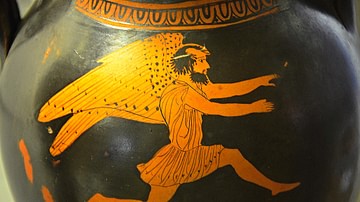Search
Did you mean: Bible?
Search Results

Definition
The Great Sphinx of Giza
The Great Sphinx of Giza is the most instantly recognizable statue associated with ancient Egypt and among the most famous in the world. The sculpture, of a recumbent lion with the head of an Egyptian king, was carved out of limestone on...

Definition
Umar
Umar ibn al-Khattab (r. 634-644 CE) was the second caliph of the Rashidun Caliphate (632-661 CE, as the first four caliphs are referred to by the Sunni Muslims). He was an early convert of Islam and one of the close companions of the Islamic...

Definition
The Canterbury Tales
The Canterbury Tales (written c. 1388-1400 CE) is a medieval literary work by the poet Geoffrey Chaucer (l. c. 1343-1400 CE) comprised of 24 tales related to a number of literary genres and touching on subjects ranging from fate to God's...

Definition
Arachne
Arachne, from the Greek arákhnē (meaning spider), is a figure in Greek mythology whose talent for weaving was renowned and who famously challenged the goddess Minerva to a weaving competition. As told in Ovid’s (43 BCE-17 CE) Metamorphoses...

Definition
Sima Qian
Sima Qian (l. 145/135-86 BCE) was a court scribe, astrologer, and historian of the Han Dynasty (202 BCE - 220 CE) of ancient China, famous for his historical work Records of the Grand Historian for which he is remembered as the Father of...

Definition
Hesiod
Hesiod (c. 700 BCE) in conjunction with Homer, is one of those almost legendary early Greek Epic poets. His works are not of comparable length to Homer's. Hesiod's poems are not epic because of their length, but because of their language...

Definition
Nitocris
Nitocris (2184-2181 BCE) is the Greek name for Nitiqret, the last monarch of the 6th Dynasty of Egypt which concluded the period of the Old Kingdom (c. 2613-2181 BCE). Nitocris is best known from the story told of her by Herodotus (484-425/413...

Definition
Boreas
Boreas is the god of the violent North Wind in Greek mythology. He is the son of the Titan Astraeus and Eos, the goddess of the dawn, and brother to Zephyrus (the West Wind) and Notus (the South Wind). He is best known for his bad temper...

Definition
Critias
Critias (l. c. 460-403 BCE) was an Athenian politician, poet, and playwright, one of Socrates' followers, Plato's second cousin, a leading member of the Thirty Tyrants of Athens, and leader of the oligarchy they established. He is referenced...

Definition
Helen (Play)
Helen is a Greek tragedy by Euripides (c. 484-407 BCE). It is usually thought to have first been performed at the Great Dionysia of 412 BCE and was part of the trilogy that included Euripides' lost Andromeda. Helen recounts an unusual version...